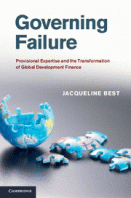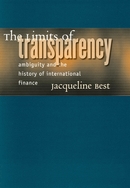 Governing Failure: Provisional Expertise and the Transformation of Global Development Finance. (Cambridge: Cambridge University Press, 2014).
Governing Failure: Provisional Expertise and the Transformation of Global Development Finance. (Cambridge: Cambridge University Press, 2014).
“Supremely over-confident in the 1980s and 1990s, international financial institutions have now recognized some of the limits of their capacity to effect change in an uncertain world. But, if structural adjustment has failed, what comes afterwards? In a brilliant analysis, Jacqueline Best shows us how the IFIs have invented a new form of “provisional governance”: failure is now anticipated, the authority of experts is known to be fragile, and government has become something of an experiment.”
Andrew Barry, University College London
“Governing Failure is a fascinating exploration of the dynamics of expertise, authority, and power in international development institutions and the paradoxes that result. Expertise generates authority, which is undermined by perceived failure resulting from contingency. Governance therefore becomes more provisional, but if it is cautious rather than experimental it ultimately jeopardizes the authority upon which these institutions rely.”
Robert O. Keohane, Woodrow Wilson School of Public and International Affairs, Princeton University
 The Return of the Public in Global Governance. Eds. Jacqueline Best and Alexandra Gheciu. (Cambridge: Cambridge University Press, 2014).
The Return of the Public in Global Governance. Eds. Jacqueline Best and Alexandra Gheciu. (Cambridge: Cambridge University Press, 2014).
Many international relations scholars argue that private authority and private actors are playing increasingly prominent roles in global governance. This book focuses on the other side of the equation: the transformation of the public dimension of governance in the era of globalization. It analyses that transformation, advancing two major claims: first, that the public is beginning to play a more significant role in global governance, and, second, that it takes a rather different form than has traditionally been understood in international relations theory. The authors suggest that unless we transcend conventional wisdom about the public as a distinct sphere, separate from the private domain, we cannot understand the dynamics and consequences of its apparent return. Using examples drawn from international political economy, international security and environmental governance, they argue that ‘the public’ should be conceptualized as a collection of culturally-specific social practices.
 Cultural Political Economy. Eds. Jacqueline Best and Matthew Paterson. (London: Routledge, 2010).
Cultural Political Economy. Eds. Jacqueline Best and Matthew Paterson. (London: Routledge, 2010).
The global political economy is inescapably cultural. Whether we talk about the economic dimensions of the “war on terror”, the sub-prime crisis and its aftermath, or the ways in which new information technology has altered practices of production and consumption, it has become increasingly clear that these processes cannot be fully captured by the hyper-rational analysis of economists or the slogans of class conflict. This book argues that culture is a concept that can be used to develop more subtle and fruitful analyses of the dynamics and problems of the global political economy.
Rediscovering the unacknowledged role of culture in the writings of classical political economists, the contributors to this volume reveal its central place in the historical evolution of post-war capitalism, exploring its continued role in contemporary economic processes that range from the commercialization of security practices to the development of ethical tourism. The book shows that culture plays a role in both constituting different forms of economic life and in shaping the diverse ways that capitalism has developed historically – from its earliest moments to its most recent challenges.
Read Chapter 1 – Understanding Cultural Political Economy
 The Limits of Transparency: Ambiguity and the History of International Governance. (Ithaca: Cornell University Press, 2005).
The Limits of Transparency: Ambiguity and the History of International Governance. (Ithaca: Cornell University Press, 2005).
A decade of crises has reminded us of the fragility of the international financial system. Conventional wisdom holds that uncertainty is the basic problem of financial governance, and attempts to contain ambiguity have dominated recent financial reform efforts. Jacqueline Best, however, contends that ambiguity can play a valuable role in international political and economic stability. The stability of the postwar era depended, Best suggests, on a carefully maintained balance between coherence and ambiguity. In her view, the collapse of the Bretton Woods exchange-rate regime was caused in large part by the increasing rigidity of the system and its corresponding inability to accommodate ambiguity.This is a novel argument in an area much discussed by economists and political scientists. Their debate has focused on uncertainty as a technical problem and transparency as the solution. Although such policies are presented as technical, Best demonstrates that they are also political, have cultural consequences, and may prove counterproductive. Rather than assume that transparency is the ultimate goal, Best argues, we must recognize that ambiguity is pervasive, substantive, and potentially constructive. To read this book is to comprehend more deeply the ways in which politics is fundamental to economic theory and practice and to understand why the economy requires political leadership in order to flourish.